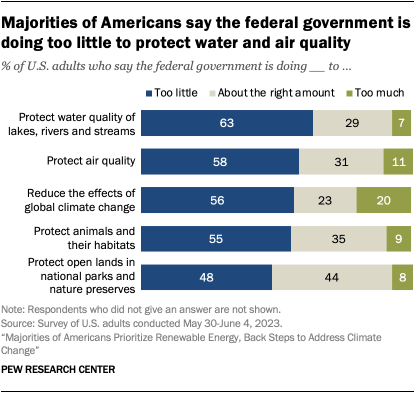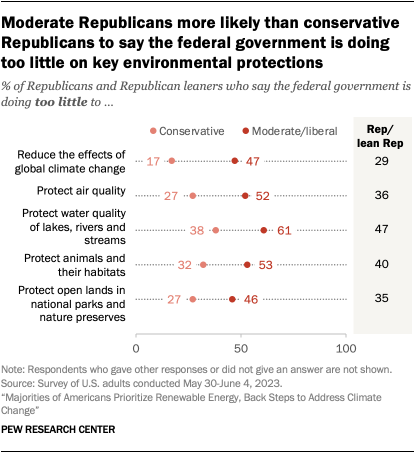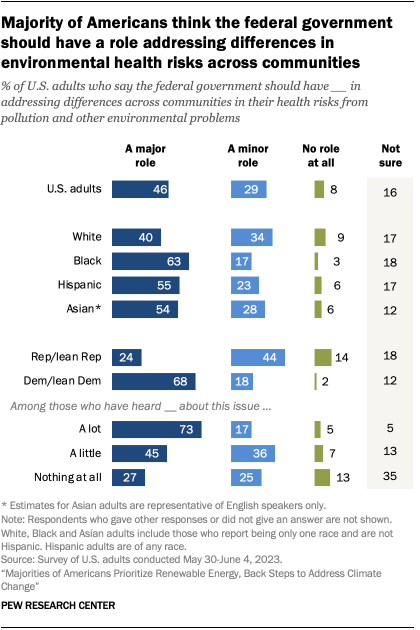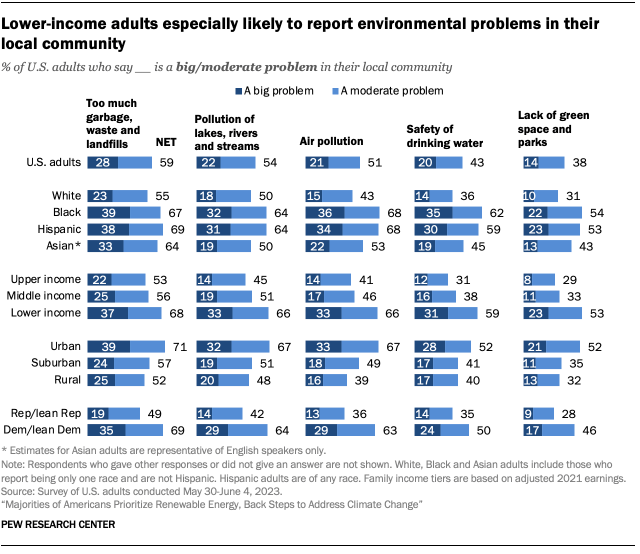
Majorities of Americans say that the federal government is doing too little to protect key areas of the environment.
Overall, 63% of U.S. adults say the federal government is doing too little to protect the quality of lakes, rivers and streams. Just 7% say too much is being done here, while 29% say the federal government is doing about the right amount in this area.
More than half of Americans also say that the federal government is doing too little to protect air quality (58%) and to protect animals and their habitats (55%).
When it comes to federal efforts on climate change, 56% say the government is doing too little on the issue, compared with 20% who say it is doing too much and 23% who say they are doing about the right amount.
About half (48%) think too little is being done to protect open lands in national parks and nature preserves, while 44% think the federal government is doing about the right amount in this area.
Majorities of Democrats see room for more federal action in areas of environmental protection
Democrats are much more likely than Republicans to say the federal government is doing too little across all five areas of environmental protection included in the survey.
For example, 77% of Democrats say the federal government is doing too little to protect water quality of lakes, rivers and streams, compared with 47% of Republicans who say the same.
The largest gap seen on this set of questions is over the federal role on climate change: 80% of Democrats say too little is being done here. By contrast, Republicans are more likely to say the federal government is doing too much (39%) rather than too little (29%) to reduce the effects of climate change.

Within the GOP, there are differences by political ideology over the federal government’s role in environmental protection.

Moderate Republicans are more likely than conservative Republicans to say the federal government is doing too little across each of the five areas included in the survey.
About six-in-ten moderate and liberal Republicans (61%) say the federal government is doing too little to protect lakes, rivers and streams. A smaller share of conservative Republicans hold this view (38%).
On climate change, 47% of moderate and liberal Republicans say too little is being done to reduce the effects of global climate change, compared with just 17% of conservative Republicans who say this.
Among Democrats, majorities of liberals as well as moderates and conservatives say the federal government is doing too little in most areas of environmental concern. Still, there are differences in how widely these views are held, with larger majorities of liberal Democrats saying the federal government is doing too little on environmental issues.
Most Americans see a role for the federal government addressing differences in environmental health risks across communities

About three-quarters of Americans think the federal government should have a major (46%) or minor (29%) role addressing differences across communities in their health risks from pollution and other environmental problems. A small share (8%) say the government should play no role in this and 16% say they aren’t sure.
Environmental factors such as air and water quality differ across communities, as people with lower incomes and racial and ethnic minorities are more likely than others to live in areas with environmental risks.
Democrats are much more likely than Republicans to say the federal government should have a major role in this (68% vs. 24%). Still, a majority of Republicans say the government should have a least a minor role.
Black, Hispanic and English-speaking Asian adults are more likely than White adults to say the federal government should play a major role in this issue. There are only modest differences by level of income, with majorities across groups supporting at least a minor role for the federal government addressing differences across communities in their environmental health risks.
Americans are generally aware of issues regarding disparities in environmental quality across communities: 77% say they have heard a lot or a little about this, compared with 22% who say they have not heard about this issue.
Those who say they are most familiar with the issue of different environmental health risks across communities are the most supportive of a federal role. Among those who have heard a lot about this issue, 73% say the federal government should play a major role addressing differences across communities in their health risks from pollution and other environmental problems.
Republicans and Democrats remain far apart over the value of environmental laws and regulations

Just over half (53%) of Americans say stricter environmental laws and regulations are worth the cost while slightly fewer (45%) say they cost too many jobs and hurt the economy.
Views on this question have changed little in the last two years, but positive views of environmental laws remain lower than in September 2o19, when 65% said they were worth the cost.
Eight-in-ten Democrats and Democratic leaners view environmental laws as worth the cost. By contrast, just 25% of Republicans and Republican leaners say this, while 74% say they cost too many jobs and hurt the economy.
Ratings of the impact of environmental laws among Republicans turned more negative between September 2019 and April 2021, a period of time with a change in presidential administrations. This shift in views among Republicans drove the overall decline in public assessments of the value of environmental laws seen in that period.
Views of environmental laws differ by ideology within both parties.
Among Republicans and Republican leaners, 83% of conservatives say stricter environmental cost too many jobs and hurt the economy. This view is less widely held among moderate and liberal Republicans: 59% say environmental laws cost too many jobs and hurt the economy, compared with 40% who say they are worth the cost.
Among Democrats and Democratic leaners, 91% of liberals view stricter environmental laws as worth the cost. Among moderate and conservative Democrats, 70% say this while 29% think they cost too many jobs and hurt the economy.
Which environmental problems do Americans see in their local area?
Many Americans see environmental problems in their own local communities, as adults with lower incomes and Black and Hispanic adults are especially likely to see problems in their area. Urban residents are also more likely to perceive environmental problems in their communities than those in suburban or rural areas.
Among all U.S. adults, 59% say their local community has a big or moderate problem with too much garbage and landfills; 54% say they have a big or moderate problem with the pollution of lakes, rivers and streams in their area. Roughly half (51%) say air pollution in their area is at least a moderate problem, while 43% say this about the safety of drinking water and 38% describe the lack of green space and parks in their community as a big or moderate problem.

Majorities of lower-income adults say most of the environmental problems in the survey are at least a moderate problem in their community. For instance, 66% of lower-income adults view air pollution as a big or moderate problem in their community and 59% say this about the safety of drinking water. Smaller shares of middle- and upper-income adults see specific environmental problems in their area.
Black and Hispanic adults are more likely than White adults to say each type of environmental problem is a big or moderate problem in their local communities. The largest differences are seen for the problems of safe drinking water and air pollution. For example, 62% of Black adults and 59% of Hispanic adults say the safety of drinking water is at least a moderate problem in their area, compared with 36% of White adults. Perceptions of local environmental issues among English-speaking Asian adults generally fall between those of White adults and Black and Hispanic adults. The survey sample primarily includes English-speaking Asian adults and, therefore, may not be representative of the overall Asian adult population.
Across community types, majorities of urban residents view too much garbage and landfills (71%), pollution of lakes, rivers and streams (67%) and air pollution (67%) as big or moderate problems in their community. While many in suburban and rural areas also report these issues, they do so at significantly lower rates. For example, 49% of people who live in suburban areas and 39% of those in rural areas say air pollution is at least a moderate problem where they live.




